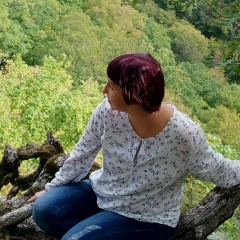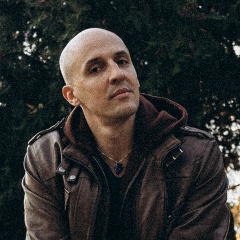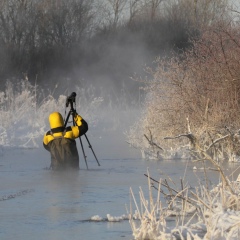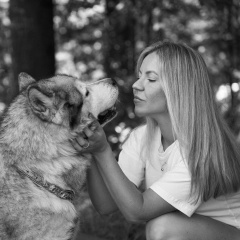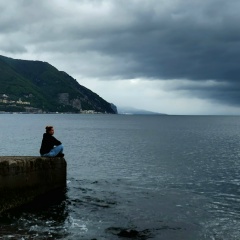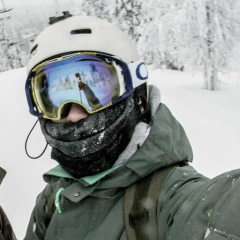Визитной карточкой Байкала часто называют весьма фотогеничную Шаман-скалу, Шаманку - она же мыс Бурхан на острове Ольхон. Скала входит в девятку святынь Азии и всячески почитается. Правда, теперь уже не понять, чья это святыня, языческая, буддийская или еще какая, так что на всякий случай ей поклоняются и те, и те.
Давным-давно в скале была пещера шамана, там он общался с духом-хозяином острова, и никто кроме шамана не мог туда войти.
С приходом буддизма в пещере поставили алтарь Будды и сюда в большом количестве приезжали молиться ламы.
Само слово "Бурхан" вполне себе многозначно и обозначает как главное божество острова и озера, так и будду или бога (от тюрско-монгольского "бог").
В Прибайкалье, Бурятии и много где в Сибири шаманизм прекрасно уживается с буддизмом и прочими религиями. Религии накатывали тут волнами, и каждая оставляла что-то после себя.
"В целом человек ищет любой возможной помощи, будь то помощь буддийского божества, современного врача с ученой степенью или шаманского духа-тэнгрия. Он может сегодня после посещения врача позвать домой шамана, чтобы сделать обряд, а завтра поехать в дацан к ламе совершить аналогичный обряд по буддийскому канону. В своей практике шаманы используют "Атлас тибетской медицины", а при гриппе рекомендуют обратиться к врачам."(http://www.shamanstvo.ru)
Прекрасный подход, мне кажется, зачем себя ограничивать зря? Главное ведь найти свое, поверить, и все будет хорошо.
Давным-давно в скале была пещера шамана, там он общался с духом-хозяином острова, и никто кроме шамана не мог туда войти.
С приходом буддизма в пещере поставили алтарь Будды и сюда в большом количестве приезжали молиться ламы.
Само слово "Бурхан" вполне себе многозначно и обозначает как главное божество острова и озера, так и будду или бога (от тюрско-монгольского "бог").
В Прибайкалье, Бурятии и много где в Сибири шаманизм прекрасно уживается с буддизмом и прочими религиями. Религии накатывали тут волнами, и каждая оставляла что-то после себя.
"В целом человек ищет любой возможной помощи, будь то помощь буддийского божества, современного врача с ученой степенью или шаманского духа-тэнгрия. Он может сегодня после посещения врача позвать домой шамана, чтобы сделать обряд, а завтра поехать в дацан к ламе совершить аналогичный обряд по буддийскому канону. В своей практике шаманы используют "Атлас тибетской медицины", а при гриппе рекомендуют обратиться к врачам."(http://www.shamanstvo.ru)
Прекрасный подход, мне кажется, зачем себя ограничивать зря? Главное ведь найти свое, поверить, и все будет хорошо.
The calling card of Lake Baikal is often called the very photogenic Shaman Rock, the Shaman - it is also Cape Burhan on the island of Olkhon. The rock is one of the nine shrines of Asia and is revered in every way. True, now it’s no longer possible to understand whose shrine it is, pagan, Buddhist, or some other, so just in case, they are worshiped.
Once upon a time there was a shaman's cave in the rock, where he communicated with the spirit master of the island, and no one but the shaman could enter there.
With the advent of Buddhism, a Buddha’s altar was placed in a cave and llamas came to pray in large numbers here.
The word "Burkhan" itself is quite ambiguous and means both the main deity of the island and the lake, and the Buddha or God (from the Turkic-Mongolian "god").
In the Baikal region, Buryatia and many other places in Siberia, shamanism coexists perfectly with Buddhism and other religions. Religions rolled here in waves, and each left something after itself.
“In general, a person is looking for any possible help, whether it be the help of a Buddhist deity, a modern doctor with an advanced degree, or a Tengri shamanic spirit. He can call a shaman today after visiting a doctor to perform a rite, and tomorrow go to the datsan to the lama to perform a similar rite according to the Buddhist canon. In their practice, shamans use the "Atlas of Tibetan medicine", and in case of flu they recommend that you consult a doctor. "(http://www.shamanstvo.ru)
Great approach, it seems to me, why limit yourself in vain? The main thing is to find your own, to believe, and everything will be fine.
Once upon a time there was a shaman's cave in the rock, where he communicated with the spirit master of the island, and no one but the shaman could enter there.
With the advent of Buddhism, a Buddha’s altar was placed in a cave and llamas came to pray in large numbers here.
The word "Burkhan" itself is quite ambiguous and means both the main deity of the island and the lake, and the Buddha or God (from the Turkic-Mongolian "god").
In the Baikal region, Buryatia and many other places in Siberia, shamanism coexists perfectly with Buddhism and other religions. Religions rolled here in waves, and each left something after itself.
“In general, a person is looking for any possible help, whether it be the help of a Buddhist deity, a modern doctor with an advanced degree, or a Tengri shamanic spirit. He can call a shaman today after visiting a doctor to perform a rite, and tomorrow go to the datsan to the lama to perform a similar rite according to the Buddhist canon. In their practice, shamans use the "Atlas of Tibetan medicine", and in case of flu they recommend that you consult a doctor. "(http://www.shamanstvo.ru)
Great approach, it seems to me, why limit yourself in vain? The main thing is to find your own, to believe, and everything will be fine.





У записи 9 лайков,
0 репостов,
210 просмотров.
0 репостов,
210 просмотров.
Эту запись оставил(а) на своей стене Ксения Шигапова



